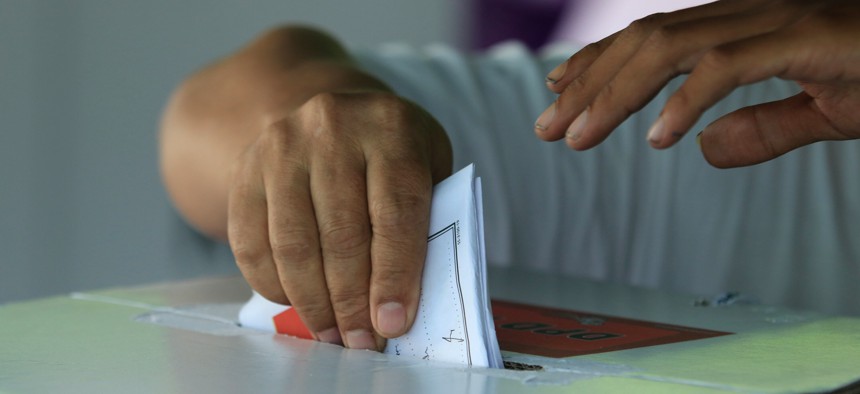Jail voting expands in Illinois

Yamtono - / EyeEm / Getty Images
Voting from jail is rare throughout the United States, but lawmakers in Illinois are paving the way for more detention facilities to offer in-person voting.
Another major jail in the Chicago area is getting a polling place.
Voting from jail is rare throughout the United States, but lawmakers in Illinois in recent years have paved the way for more detention facilities to offer in-person voting. Will County Detention Facility, which houses around 600 detainees, will be just the second jail in the state to open a polling place for primary and general elections, joining Cook County Jail in Chicago.
In most states, people who are convicted of felonies lose their right to vote. But many people in jail have not been convicted of a crime or are serving time for a misdemeanor and therefore still are eligible to cast a ballot.
Some residents sit in jail through election season, awaiting trial or unable to pay bond–which means they can’t go to polling places.
Activists have pushed for greater access to voting in jails with limited success in the country. Illinois is one of few states that have created a mechanism by which jails can become polling places. Los Angeles County and Washington, D.C., also allow in-person voting in jails.
That needs to change, voting rights activists argue.
“It’s not about party lines. It’s about the law. It’s about right and wrong,” said Pamela Fort, a coordinator at Speak Up and Vote, a Joliet, Illinois-based nonpartisan voter registration organization that advocated for the Will County, Illinois, polling place. “If you haven’t been convicted, then you have the right to vote.”
In 2019, Illinois Democratic Gov. J.B. Pritzker signed into law a measure that allowed only Cook County to set up polling places in its detention facilities. But after seeing successful voting in the 2020 primary and presidential election, voting rights activists worked to expand the law to the state’s other 101 counties.
Pritzker signed legislation last June to expand the criteria for counties to establish polling places in jail. Will County, a community of 700,000 residents southwest of Chicago, is the first county in Illinois to take advantage of the new law. Detainees who are Will County residents will be able to vote in person at the jail. Non-locals will be able to vote by mail. The polling place will run for five hours a day over one weekend in June for the state primary.
Former Democratic state Sen. John Connor, who added the key amendment to an omnibus election bill that allowed for more jail voting, called Will County’s decision a success story.
“Within the state legislature, you don’t get a lot of easy problems to solve,” he said in a news conference this week, standing outside the facility. “This was one of those easy problems to solve.”
This is welcome news for Sherry Williams, who for 30 years worked as a classification specialist for the Will County jail. Whenever Election Day rolled around, no one in the jail mentioned voting as a possibility for the detainees, she recalled.
“It’s dehumanizing,” said Williams, who now serves as a coordinator for Speak Up and Vote, the group behind this latest effort. “We discovered [detainees] didn’t realize they’re eligible to vote, so they didn’t try. They should be voting if they’re eligible to vote.”
Stand Up and Vote organizers still are pushing the jail to offer voter registration drives for detainees, but they have faced some resistance from Will County Sheriff Mike Kelley, a Democrat.
Kathy Hoffmeyer, the public information officer for the sheriff’s office, told Stateline voter registration drives in the jail are logistically impossible at the moment. The jail, she said, is short-staffed. Illinois, she pointed out, does allow for same-day voter registration, giving detainees who aren’t registered to vote before Election Day a chance to cast a ballot.
This article was first posted on Stateline, an initiative of The Pew Charitable Trusts.





